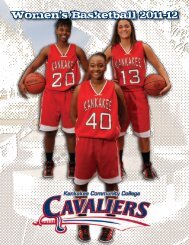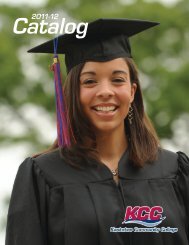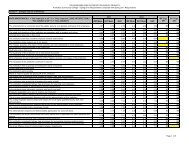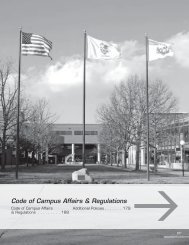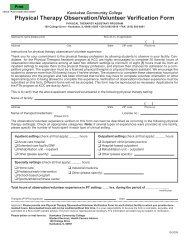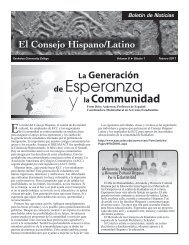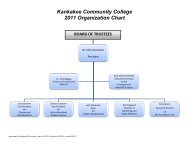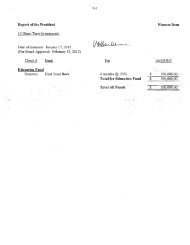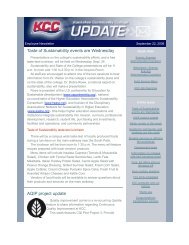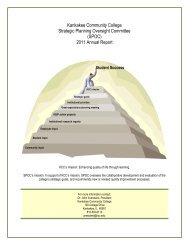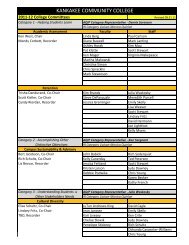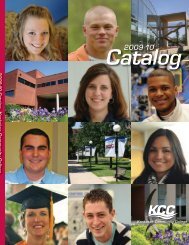Course Descriptions - Kankakee Community College
Course Descriptions - Kankakee Community College
Course Descriptions - Kankakee Community College
You also want an ePaper? Increase the reach of your titles
YUMPU automatically turns print PDFs into web optimized ePapers that Google loves.
procedure. Special emphasis will be placed on Illinois and federal<br />
civil codes. The role of the paralegal in civil litigation, from the<br />
client interview through the appeals process, will be addressed.<br />
PLAS 2113 - Legal Technology 3/0 (3)<br />
Prerequisites: PLAS 1133 or concurrent enrollment. This course<br />
gives the paralegal student a thorough overview of technology<br />
used in the law office. Students will complete online research<br />
assignments and use demonstration models of a variety of legal<br />
software applications.<br />
PLAS 2213 - Real Estate Law 3/0 (3)<br />
Prerequisites: PLAS 1133 or concurrent enrollment. This course<br />
provides a comprehensive understanding of the law of real<br />
property. Types of ownership, surveys and legal descriptions,<br />
and encumbrances are discussed. The course also addresses<br />
contracts and related issues; property transfers by deed; real<br />
estate finance and mortgages; title to property; and real estate<br />
closings. The paralegal’s role in these transactions is a foundation<br />
of the course.<br />
PLAS 2223 - Estates, Trusts, & Wills 3/0 (3)<br />
Prerequisites: PLAS 1133 or concurrent enrollment. This course<br />
covers the law of the estate planning and probate processes and<br />
specifically addresses the role of the paralegal in such transactions.<br />
Special emphasis will be placed on Illinois law in the drafting of<br />
wills and trusts. The course also addresses the statutory guidelines<br />
and court rules that apply to the probate process.<br />
PLAS 2233 - Criminal Litigation 3/0 (3)<br />
Prerequisites: PLAS 1133 or concurrent enrollment; and PLAS<br />
1213. This course covers both substantive criminal law and<br />
criminal procedure. Special emphasis will be placed on Illinois<br />
and federal criminal codes. The role of the paralegal in criminal<br />
litigation, both from prosecution and defense perspectives, will<br />
be addressed.<br />
PLAS 2253 - Corporate Law 3/0 (3)<br />
Prerequisites: PLAS 1133 or concurrent enrollment. This course<br />
covers the law of business organizations, including corporations,<br />
partnerships, and sole proprietorships. Information on corporate<br />
finance and securities regulations, changes to corporate structure,<br />
and the role of a corporate paralegal also are covered.<br />
PLAS 2263 - Family Law 3/0 (3)<br />
Prerequisites: PLAS 1133 or concurrent enrollment and one<br />
of the following: COSC 1372, Microsoft Office Specialist<br />
Certification, or instructor consent. This course provides a<br />
detailed review of family law issues in Illinois and the paralegal’s<br />
role in addressing these issues. Special emphasis will<br />
be placed on current trends in family law and the implications<br />
of these trends on family law proceedings in the 21st<br />
Judicial Circuit.<br />
PLAS 2333 - Laws of Evidence 3/0 (3)<br />
Prerequisite: PLAS 1133 or concurrent enrollment. This course<br />
provides a detailed review of the rules of evidence and emphasizes<br />
the role and importance of these rules to any legal action.<br />
The course specifically emphasizes how the paralegal assists the<br />
attorney in recognizing and identifying admissible evidence and<br />
the challenges to admissibility of evidence.<br />
PLAS 2403 - Special Topics in Paralegal Studies 3/0 (3)<br />
Prerequisites: PLAS 1123, PLAS 1133, and PLAS 2113; or consent<br />
of the program coordinator. This course allows the student to<br />
apply knowledge of the law to a problem or research topic under<br />
the supervision of the program coordinator. A comprehensive<br />
capstone project or legal research project will be required at the<br />
conclusion of the course.<br />
PLAS 2413 - Paralegal Internship 3/0 (3)<br />
Prerequisites: Completion of all required PLAS courses or consent<br />
of the program coordinator. This course is a culmination of all<br />
previous PLAS courses and applies the paralegal skills learned<br />
in class to use in a real-life setting. 240 hours of on-site time will<br />
be required for three credit hours. The program coordinator will<br />
make periodic visits to the site for observation and feedback from<br />
the internship provider.<br />
Paramedic<br />
Students in the Paramedic Supervision and Emergency Medical<br />
Technician programs are advised to consult the Code of<br />
Campus Affairs and Regulations, section 11.4, Page 173.<br />
This regulation concerns completion of all PMED and PEPC<br />
courses in these curriculums with a grade of C or better.<br />
PEPC 1308 - Emergency Medical Technician –<br />
Intermediate I 8/0 (8)<br />
Prerequisite: PMED 1017; successful completion of the state certification<br />
exam for EMT-B; and proof of current CPR certification<br />
at the “Health Care Provider” level. The student is introduced to<br />
the roles of the EMT-Intermediate/Defibrillator and the paramedic<br />
as well as the ethical and legal aspects of the Emergency Medical<br />
Services system. Human anatomy and physiology are reviewed as<br />
the student studies primary and secondary physical assessment. The<br />
student is introduced to pharmacology and general drug groupings<br />
as well as the calculation of drug dosages using the metric system.<br />
The classification of specific drugs, their therapeutic effect, indications<br />
and contraindications, side effects and correct dosages will<br />
be studied. The student will learn to administer drugs through the<br />
various routes. The student is taught how to use various radios and<br />
telecommunication devices to communicate patient information to<br />
hospitals. The student also will learn how to manage traumatic injuries<br />
including those relating to fluids, shock, and trauma-related<br />
respiratory and cardiac emergencies. Selected clinical experiences<br />
will be provided to correlate with the course content.<br />
PEPC 1318 - Emergency Medical Technician –<br />
Intermediate II 8/0 (8)<br />
Prerequisite: PEPC 1308 or concurrent enrollment. The anatomy<br />
and physiology of the cardiovascular system will be studied, with<br />
emphasis on the structure, function, and electrical conduction<br />
system of the heart as well as the pathophysiology and emergency<br />
management of cardiovascular and non-trauma-related respiratory<br />
problems. The student also will study the electrocardiogram<br />
(EKG) interpretation and treatment of various arrhythmias<br />
and specific treatment techniques including EKG monitoring,<br />
defibrillation, and cardioversion. A variety of common medical<br />
emergencies and their management will be studied, including<br />
those in the areas of obstetric and gynecologic, pediatric-neonatal,<br />
psychiatric, behavioral, neurological, and environmental. The<br />
student also will study infectious and communicable diseases.<br />
PEPC 1324 - Emergency Medical Technician –<br />
Intermediate III 0/8 (4)<br />
Prerequisite: PEPC 1318 or concurrent enrollment. The clinical<br />
rotation requirements for this course are designed to augment<br />
2010-11 catalog • www.kcc.edu<br />
151



